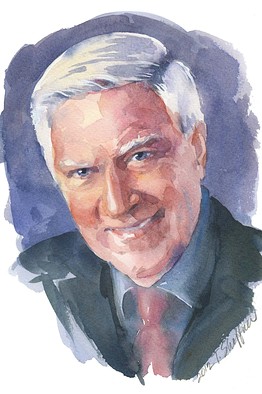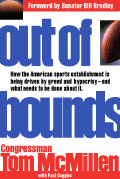A Bitter Lesson in Basketball and Terrorism

Illustration by Terry Shoffner
by Stephen Moore
‘That was the most bitter and painful experience of my life,” observes Tom McMillen. “What happened in Munich was the most controversial and tragic sports competition in modern times.”
Mr. McMillen is a former college and NBA basketball star, Rhodes scholar, three-term Democratic member of Congress, and now successful businessman. We’re in his Northern Virginia office reminiscing about the continuing impact of the 1972 Olympic Games, held 40 years ago this summer. Overshadowing it all is the tragedy of what TV announcer Jim McKay called “the worst day in the history of sports.”
That was the hostage crisis in the Olympic Village, which culminated in the murder of 11 Israeli athletes and coaches by Palestinian terrorists (linked to the Fatah group that we now know enjoyed Soviet funding and training for many years). Four days later was the disputed basketball game between the U.S. and the Soviet Union, in which Mr. McMillen played a pivotal role.
Although there is no comparison between the two events in Mr. McMillen’s mind, the injustice of that contest left an indelible mark.
First, to reset the stage of that basketball game:
There are three seconds on the game clock. The Soviet Union leads the United States 50-49. A 19-year-old, floppy-haired Doug Collins, wearing the team’s white jersey with the blue letters U S A across the front (the Soviets wear red), has been flagrantly fouled by a Soviet player after stealing the ball and going up for what could have been the game-winning layup. Groggy from crashing his head on the floor, Collins steps to the line and calmly hits the first free throw to tie the game.
A few seconds later, the Soviets try to call a timeout, but it is too late. Collins is already in the motion of swishing the second foul shot. The U.S. leads for the first time in the game, 51-50—a spectacular and scrappy comeback that has erased a 10-point second-half lead by the methodical, bulky and professional Soviet team. The Soviets immediately throw the ball in bounds, but the clock expires before they get a shot off.
What happened next was “bedlam and hysteria,” Mr. McMillen recalls. “We’ve preserved America’s 63-game winning streak in Olympic basketball.” But wait. It’s not over. A thickly accented German official announces on the public address system: “Ze game is not over, put three seconds on ze clock.” The officials have decided that the Soviets did call a timeout. Now the Soviets hurriedly take the ball out again. This time their desperation shot misses, careening off the rim, and again the game is over.
More pandemonium. Fans storm the court as the young Americans players hug each other in celebration. A TV camera catches Tom McMillen dancing around with his arms lifted in what he says now was a combination of “joy and a lot of relief.”
But wait again. The Olympic officials reconvene and instruct the teams to run the play again because of a clock malfunction. The Americans are stunned, disorganized. One more time the Soviets get the ball under their own basket. “The referee inappropriately instructs me to back away from the inbounds line so I cannot disrupt the pass, which I’m entitled to do,” says Mr. McMillen. “But I don’t want to get called for a technical foul.”
The ball is perfectly heaved the length of the court. The gifted center for the Soviets, Alexander Belov, “shoves away one of his American defenders” (strangely, the 7-foot, 4-inch U.S. center Tom Burleson isn’t on the court to knock away the pass because of all the confusion), makes the improbable catch, and tosses in what is declared the game-winning layup.
TV announcer Frank Gifford told an outraged American audience: “And this time it really is over.” It was. And yet to this day it still isn’t over. As another of the American players, Kenny Davis, recently told me, “40 years later that game just keeps getting bigger and bigger.”
Olympic competitions are meant to promote sportsmanship and ease national tensions, but the 1972 games shattered that illusion in ways large and small. Four days before the U.S.-Soviet game was played, the world watched in horror as Israeli athletes were taken hostage by heavily armed Palestinians in black ski masks. After two days of hair-trigger tension and fruitless negotiations, a shootout left nine Israeli athletes and two coaches dead. Jewish blood was spilled on German soil again.
‘The terrible irony,” notes Mr. McMillen, “is that the Germans had taken great pains to erase every trace of the 1936 Olympics in Berlin, which had been a showcase for Hitler. A few days before the games we had visited Dachau, one of the sites of the concentration camps.”
After the massacre, what he calls “a fog of depression” took over the Olympic Village. “We were fearful of more incidents. We had to go to practice while all this turmoil was going on.” Today, he says, “Looking back on it, this really was the beginning of the modern age of terrorism.” Back then, he adds, “a lot of us thought the games should be canceled.” Yet now he believes that would have been “succumbing to the terrorists, which you never do.”
Then came the basketball game, with the stakes magnified because “there were so many crosscurrents to politics,” so that it became a game inside a bigger “global political game,” Mr. McMillen says. John Bach, then a U.S. assistant coach, recalls the same sensations: “It felt like the Cold War was being played out on the basketball court.”
Cold War politics seemed to intervene at every stage. One anti-hero was the head of the International Basketball Federation, William Jones, a Brit who had made it publicly known that he thought U.S. dominance in Olympic basketball was holding back the sport. During the chaos, “it was Mr. Jones who emerged from the stands and commanded the referees to put three seconds back on the clock,” Mr. McMillen says. One of the referees, a Brazilian, refused to certify the Soviet victory. But the next day, the Olympic board of appeals ruled against the Americans.
Mr. McMillen scoffs at the ruling: “There were five members on the panel, including three from East Bloc countries. Can you imagine a Hungarian official voting with us? We never had a chance. . . . You have to understand. The Soviets really wanted to beat us—to show the world.” Since this was all about global politics, he says bitterly, “Brezhnev and Nixon could have saved us a lot of time if we had not bothered with the basketball game at all. They should have just had the two of them arm-wrestle.”
The Americans voted unanimously not to accept their silver medals, the first time that had happened in the Olympics. The U.S. players still take pride in that protest. Kenny Davis’s will even stipulates that neither his children nor their descendants shall ever “accept the silver medal.”
The U.S.-Soviet contest had lasting effects. It changed the American team’s approach to Olympic play. Mr. McMillen and many other players are still openly critical of legendary Olympic coach Hank Iba and the effect of his slow-down strategy on the 1972 final.
“We were faster, more agile and more athletic, but we played exactly the style of play that suited the Soviets,” grouses Mr. McMillen. Tom Henderson agrees: “We should have run them back to Russia.” In 1976 the U.S. team coached by Dean Smith ran up and down the floor and won back the gold medal.
Another legacy was to “end the era of the invincibility of the United States,” Mr. McMillen says. “Nations who were trying to do whatever they can to emulate us, all of a sudden felt that they could compete.” First in Europe, then in Asia, Africa and South America, foreigners rapidly narrowed the skills gap with the U.S. The upside? “The NBA was a big beneficiary of that game, because it internationalized basketball—the players and the fan base,” explains Mr. McMillen.
The 1972 match also was the beginning of the end for the Olympic policy that prohibited American professional athletes from competing even though the Soviets and other nations were stocked with paid “amateurs.” The Soviet basketball team was a paid club team that had played several hundred games together for three years.
“They were aged 30,” Mr. McMillen says. “We were called the ‘Kiddie Corps’ because we were 20-year-old college kids who had never played together.” After he became a member of Congress, Mr. McMillen introduced a resolution that professional athletes should be allowed to compete in the Olympics.
There are echoes of the events of Munich in Mr. McMillen’s later life. After graduating from the University of Maryland, he passed up the NBA draft to pursue a Rhodes Scholarship at Oxford. There, in the mid-1970s, he again experienced terrorism first-hand, during the IRA bombings in London.
“I always said to myself, this is going to come to America. I was shocked it took till ’93 really for the first World Trade Center incident,” he says. “Then when 9/11 occurred, I was convinced that this was going to be a huge effort by our government to fight global terrorism.” Mr. McMillen went into the homeland-security business, producing antiterrorism supplies such as gas masks and radiation-detection devices and developing expertise in cybersecurity.
How well are we protected now? “We’ve hardened our key vulnerabilities dramatically since 9/11,” he says. But he’s worried about a catastrophic breach in cybersecurity: “A virus to computer codes can cause a lot of physical destruction that we have never really thought about as a country. It can bring a plane down. Airplanes are flown by navigation system computers.” He rattles off other cyberthreats—attacks that could cut off drinking water, electricity and access to bank accounts, or cause a meltdown at a nuclear plant. Scary stuff.
In all these years, Mr. McMillen has never given up on another dream: to persuade the Olympic Committee to award the 1972 U.S. basketball team a dual gold medal. He’s proposing a “grand compromise with the Russians where they agree to give us a gold, and we donate those medals to Russian charity and we take care of thousands of orphan children.”
He adds hopefully, “You would think that something good has to come out of this.” But he admits that’s not likely.
This summer Mr. McMillen and nearly all the surviving players and coaches of the 1972 U.S. Olympic basketball team will gather in Kentucky for the 40-year reunion. The players I have talked to, bitter as they still are after all these years, agree that in the end it was just a basketball game. “The thing to really feel sad about is those nine Israeli kids who lost their lives in Munich.”








